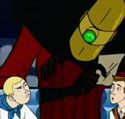|
Too much talk of scales and modes. Talk to me about musical form!! About how large scale compositions are structured, what the elements of those structures are, what we know works and why, and how to critique and iterate on your own compositionís form. Form is very neglected in comparison to scales and intervals and it should have equal representation because thatís like half of making music.
|
|
|
|

|
| # ? Jun 8, 2024 00:11 |
|
I agree. Itís not exactly what youíre asking but the really famous classical forms are all extensively detailed on Wikipedia. I usually start with sonata form and get lost in a wiki black hole from there
|
|
|
|
InternetOfTwinks posted:I think I finally get tritones now, realizing they are unique to each diatonic key made it click a bit with regard to why they are important to incorporate. a quick note: there are only 6 unique tritones, each tritone relates to two diatonic keys. For instance the F/B tritone is in the key of C major and also in #F major, hence the tritone substitution of #C7 for G7 in the key of C, both dominant chords contain the same F/B tritone.
|
|
|
|
Oh that makes sense, just switching which scale degree the notes of the tritone are. Must have misunderstood that bit in the book a bit.
|
|
|
|
Oh, I actually have a harmonic question. Are G and D one fifth away, or one fourth away? Cause D4 is 7 semitones away from G3, but G4 is 5 semitones away from D4. Changing a chord from D4-G4 to G3-D4 is doing something to how this sounds.
|
|
|
|
Pollyanna posted:Oh, I actually have a harmonic question. Are G and D one fifth away, or one fourth away? Cause D4 is 7 semitones away from G3, but G4 is 5 semitones away from D4. Changing a chord from D4-G4 to G3-D4 is doing something to how this sounds. in a way, both - they're inversions of each other! by convention, intervals are labeled by counting from the lowest note up. so, you're correct on both - G to D is a perfect 5th, and D to G is a perfect 4th. (inversions will always add up to 9. some other examples: major 3rd / minor 6th, major 2nd / minor 7th etc. another detail: inverted perfect intervals are also perfect. inverted major intervals become minor and vice versa.)
|
|
|
|
Pollyanna posted:Changing a chord from D4-G4 to G3-D4 is doing something to how this sounds. Yeah definitely. This is also called an inversion (chord inversion vs interval inversion). The simplest/most common case of inversions changing how we perceive chords is I (major chord based on the tonic in root position, say CEG with C on the bottom in C major) versus I64 (same chord but with G on the bottom, so GCE or GEC. The bottom note matters most for our aural interpretation). A I chord will make something sound finished, complete, stable, etc. A I64 on the other hand feels unstable, like itís moving somewhere - often to V and then I for real.
|
|
|
|
Pollyanna posted:Oh, I actually have a harmonic question. Are G and D one fifth away, or one fourth away? Cause D4 is 7 semitones away from G3, but G4 is 5 semitones away from D4. Changing a chord from D4-G4 to G3-D4 is doing something to how this sounds. other posts explain in in detail, my short answer: depends on which note is lower! if it's a G with a D in the bass, its a perfect fourth. if it's a D with a G in the bass, it's a perfect fifth. a.p. dent posted:inversions will always add up to 9. some other examples: major 3rd / minor 6th, major 2nd / minor 7th etc this confused me for a moment, but it makes sense. never thought about it this way before! my thinking was "the semitones add up to 12". Hawkperson posted:Yeah definitely. This is also called an inversion (chord inversion vs interval inversion). The simplest/most common case of inversions changing how we perceive chords is I (major chord based on the tonic in root position, say CEG with C on the bottom in C major) versus I64 (same chord but with G on the bottom, so GCE or GEC. The bottom note matters most for our aural interpretation). A I chord will make something sound finished, complete, stable, etc. A I64 on the other hand feels unstable, like itís moving somewhere - often to V and then I for real. good explanation about why the bass note of an interval decides what we call it, because it changes the feel
|
|
|
|
This might be of interest to some of yall - I think it was here that I heard about meta harmony in the first place, but I can't find a post about it. https://metaharmony.vhx.tv/ There's a youtube channel that's free that shows the basic ideas, which seem interesting to me. It's apparently based on Barry Harris stuff and it's a different way to think about chords and how they relate to each other.
|
|
|
|
Pollyanna posted:Too much talk of scales and modes. Talk to me about musical form!! About how large scale compositions are structured, what the elements of those structures are, what we know works and why, and how to critique and iterate on your own compositionís form. i don't know much about large scale, classical forms, but song form... there's lots of tricks to keep things interesting. i use the idea of "balanced / unbalanced" phrases a lot. even numbers of measures create a balanced phrase that sounds stable. odd numbers of measures can make the phrase feel unfinished and build tension. also, like changing dynamics, i never like to repeat a section verbatim. i'll often remove just a single measure to make the phrase stand out more, or add an extra repeated measure for emphasis. lots of ideas to play with there.
|
|
|
|
For someone who is just starting to peek into music theory are there any good book recommendations outside of whatís in the OP?
|
|
|
|
Dr. VooDoo posted:For someone who is just starting to peek into music theory are there any good book recommendations outside of whatís in the OP? I like "How Music Really Works" by Wayne Chase. It's come up a few times in this thread, you can find discussions some pages back.
|
|
|
|
ColdPie posted:I like "How Music Really Works" by Wayne Chase. It's come up a few times in this thread, you can find discussions some pages back. i started reading this one, and i haven't been able to get thru it -- too much filler! so many little vignettes about cowboys in the wild west too. The explanations are thorough and good, but it has sort of worn out its welcome with me, since most (but not all) of the material he is presented so far is review for me. Instead I recommend: The Jazz Theory Book by Mark Levine. It's pretty succinct in comparison -- it doesn't purport to derive musical truths from first principles, it's more of a pragmatic explanation. Levine's voice is more musician-to-musician whereas Chase's voice is more teacher-to-pupil (at least in my subjective reading). I prefer Levine, but others might like the didactic tone in Chase. Can't go wrong with either or with both! havelock posted:This might be of interest to some of yall - I think it was here that I heard about meta harmony in the first place, but I can't find a post about it. Thanks for posting that... (scrubbing thru the video) He's using a tesseract (aka hyper-cube)! Pretty heady stuff!. Probably related: https://www.youtube.com/@TheLabyrinthofLimitations/videos Here is another youtube channel discussing music theory from Barry Harris (rest in peace and thanks for all the music, Barry) EDIT: oops rest in peace Mark Levine (who also died that winter), and thanks for writing it all down in a book (Barry preferred to be like Jesus and let his disciples do all the writing lol) Helianthus Annuus fucked around with this message at 17:58 on Jan 7, 2023 |
|
|
|
Yeah there's certainly a lot of filler. I skipped all the dumb western stuff, and the first full section or two of the book are arguably not even necessary, though I did find them interesting personally. But, being completely new to music theory, I found the explanation of the physical basis of what notes and scales and chords even are to be really helpful, before it gets into the actual theory names and concepts we use to make and talk about music. The book helped me get from zero knowledge to an understanding of music concepts & the lingo, which then unlocks more advanced material that wouldn't have made sense to me without it.
|
|
|
|
I'll also give The Jazz Theory & Jazz Piano books by Levine a vouch. They're both very approachable, light on filler, and have a lot of really practical & immediately useable bits of info on different styles and conventions that can be applied to pretty much anything, not only jazz, the theory that gets covered is applicable to just about anything one way or another the way Levine doesn't waste time on poo poo unless it's useful and relevant to the stuff being covered in that section made it really easy to retain the info for me too, not constantly referencing footnotes and appendices like the oxford theory books (which are very thorough and make for excellent resources, but good god they're dry and dense and weigh 30lb)
|
|
|
|
What time signature would i use for the second bar/how would I write this phrase without the final rest at the end? 11/16? that would still have a bit of an extended gap on the last note wouldnt it?  been trying to work this out in guitar pro and cant tell if its me or a limitation of the cheap software.
|
|
|
|
Yes, it would. Do you need it to be expressed in triplet 16ths? You could write it as 8th notes (no triplets) in 11/8 and beam it so that it was understood to emphasize every third note, with a tempo change marking. Depending on whatís surrounding this excerpt that might just cause other reading problems though. Edit: I mean 17/8
|
|
|
|
oh i forgot an important piece of context, its a loop. er, i mean, i play it as a continous loop with no rests. its a drum tom exercise i tried to write down. after those last two triplets i repeat it, skipping that 16th rest. id very much like to keep it expressed as triplets
|
|
|
|
I'd be curious to know what it sounds like, that might help with knowing how to notate it most clearly. Do you like that it's separated into two measures as well?
|
|
|
|
Yeah, a recording would help a lot.
|
|
|
|
Hawkperson posted:I'd be curious to know what it sounds like, that might help with knowing how to notate it most clearly. Do you like that it's separated into two measures as well? ill record a take here in a bit to share!
|
|
|
|
Speaking of time signatures, I've been taking lessons lately and we talked on compound vs signature. I tried coming up with a little thing and really just want to know if I have the right idea. Does this seem properly 12/8 to you guys? Uploading the midi audio along with the GP guitar and drum track. It's pretty short and just repeats 3 times. From what I understand so far, 12/8 should just mean each measure can grouped into 3 1/8th notes(or rather the space of it, it doesn't have to always be 3 notes) 4 times, so there are 4 pulses with 3 1/8th notes between them. Is that right? It seems to make sense well enough for like a guitar riff, but drums seem a little more complicated to my brain for some reason. https://soundcloud.com/user-7364848...=social_sharing  Excuse the drum notation, when I'm trying to come up with stuff it's easier to just put 16th note rests and insert stuff in, although I'm sure there's a better way to do it, I just haven't mastered guitar pro workflow yet. Drunk Driver Dad fucked around with this message at 02:50 on Jan 15, 2023 |
|
|
|
Hawkperson posted:I'd be curious to know what it sounds like, that might help with knowing how to notate it most clearly. Do you like that it's separated into two measures as well? Pollyanna posted:Yeah, a recording would help a lot. brief explainer with a take https://soundcloud.com/macro_bulk/1-14-2023-drum-tom-warmup-count (i think i screwed up the third loop) KoRMaK fucked around with this message at 03:44 on Jan 15, 2023 |
|
|
|
Yeah I think the clearest possible way to write it is something like this: 
|
|
|
|
Hawkperson posted:Yeah I think the clearest possible way to write it is something like this:
|
|
|
|
Sorry for this poo poo opinion but Tom Cardy is a great if not greater musical harmony person than Jacob Collier.
|
|
|
|
|
I donít even know who Jacob Collier is.
|
|
|
|
Pollyanna posted:I donít even know who Jacob Collier is. drat I'm really sorry to hear that. check out this youtube channel that was originally dedicated to transcriptions of Collier's music, and has since expanded to transcribing all kinds of insanely good performances
|
|
|
|
Pollyanna posted:I donít even know who Jacob Collier is. god i wish this were me
|
|
|
|
I like Tom Cardy but I donít think thatís true.
|
|
|
|
Pollyanna posted:I donít even know who Jacob Collier is. He's a super knowledgeable and enthusiastic teacher of music related stuff. Unfortunately, IMO, almost all of his music is boring and unlistenable, though it makes music majors go insane with envy. He's incredibly talented.
|
|
|
landgrabber posted:god i wish this were me This got a literal lol from me. Just curious from the thread, how many of yall are primarily bass players? Its wild the adam neely, 12tone, and his podcast partner and a few other theory podcasters are all primarily bass players. As am I, although Im not at all close to being any actual theorist. Also a ton of my favorite acts have bassist doing most of the composition and are often band leaders/ music directors for stadium acts. Anyone notice this or is it just confirmation bias? Anyways, bought that ridiculous ďamethyst sparkleĒ stingray. Gets here tuesday. Also Im gonna try to start up a convo here about all the wats to use augmented chords, mainly how to set them up and resolve them.
|
|
|
|
|
I'm a primary bassist, never got the hang of the keyboard. I find that bass and theory complement each other super nicely in jazz and classical contexts since you're working with the literal foundation of the harmony, and everything just proceeds from there. The V+ chord gives nice strong voice leading to the I in a major key (or to strengthen a Picardy cadence), as the #2 leads right up to the major third. Useful for setting up a deceptive cadence, too. Turn into a V7#5 and you get a nice diminished third resolving inward to a unison! Edit: since the augmented chord is symmetrical (major thirds all the way up) you can also use it for modulations to keys a major third apart by using it as a common V+ chord in both keys. Remalle fucked around with this message at 03:07 on Feb 6, 2023 |
|
|
|
|
havelock posted:He's a super knowledgeable and enthusiastic teacher of music related stuff. Unfortunately, IMO, almost all of his music is boring and unlistenable, though it makes music majors go insane with envy. He's incredibly talented. i was a music major for like a year and we all ripped on jacob collier.
|
|
|
|
landgrabber posted:i was a music major for like a year and we all ripped on jacob collier. Oh, interesting....anything specific? His compositions seem to do crazy chord progressions and substitutions that it takes a music degree to even notice, much less appreciate.
|
|
|
|
havelock posted:His compositions seem to do crazy chord progressions and substitutions that it takes a music degree to even notice, much less appreciate. gonna have to disagree with this one. a music degree certainly helps, but people generally have sharper ears than their capacity for using words to describe music allows
|
|
|
webcams for christ posted:gonna have to disagree with this one. a music degree certainly helps, but people generally have sharper ears than their capacity for using words to describe music allows Definitely true in general. Itís wild why and how power chords work. None of this makes colliers music enjoyable instead of almost exclusively being fodder for artless academic dialogue
|
|
|
|
|
lol I read that as "its needlessly complicated and sucks rear end unless you're a student going 'I see what he did there' "
|
|
|
|
havelock posted:Oh, interesting....anything specific? performance kids thought he sucked because they resented learning theory and thought the microtonal bullshit was kinda funny. i was more of a comp student and thought he blew because yeah, i love theory a lot, but kind of the point to me of theory is that it allows me to understand how music works-- so that i can more easily find out what makes a sound that's evocative to me in music i love, and how to more easily write my own music.
|
|
|
|

|
| # ? Jun 8, 2024 00:11 |
|
JamesKPolk posted:lol I read that as "its needlessly complicated and sucks rear end unless you're a student going 'I see what he did there' " If you're replying to me, that's what I meant 
|
|
|



























